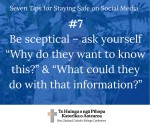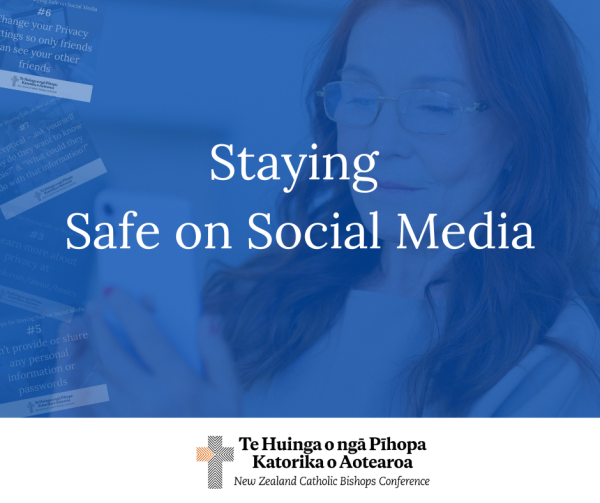Catholic bishops support Staying Safe on Social Media campaign

New Zealand’s Catholic bishops are supporting a campaign to help people stay safe on social media. The campaign follows diocesan communications and pastoral staff around the country noticing increased suspicious activities on Church social media pages they manage.
The Staying Safe on Social Media campaign started on Monday, 20 March, featuring special posts each day for seven days on Church Facebook and other social media suggesting people take such precautions as “never accept a friend request from someone you don’t know personally.”
Resources for the campaign are below this statement.
Recent suspicious activity includes comments, “likes” and emoji symbols such as “hands in prayer” being posted on Church social media pages from fake profiles; the infiltration of Catholic Facebook groups by fake profiles; and the sending of friend requests and private messages to people within the Catholic community from these fake profiles.
Such suspicious activities have been noted in all six Catholic dioceses, on parish social media and other Church social media such as the NZ Catholic Bishops Conference and Catholic Enquiry Centre Facebook pages.
Though Church communications staff check and block these fake profiles as they are noticed, new ones keep appearing.
Palmerston North Diocese communications coordinator Isabella McCafferty has helped initiate Staying Safe on Social Media. She says the main concern is that people might not be aware of the possibility of fake profiles, and therefore risk being taken advantage of.
“Our campaign aims to draw attention to ways in which people can keep themselves safe on social media. We have come up with seven key points, which we will share across all Catholic social media pages in the country – one point a day from Monday March 20 to Sunday March 26,” Isabella McCafferty says.
“We are looking for help to ensure this campaign reaches as many people as possible. If you run a Catholic social media page, please download the campaign resources [links below] and share them across your pages during the campaign. They are clearly labelled so you will know which one to put up on which day. Alternatively, if you don’t run a social media page but know someone who does, please send these resources on to them.”
• Read and download the seven safety tips for the Staying Safe on Social Media day-by-day campaign here in PDF format and here in Word format.
Resources for the Staying Safe on Social Media campaign: social media slides and text-wording for the daily posts
• Tip #1 Monday 20 March: Never accept a friend request from someone you don’t know personally! Post text: Only ever accept friend requests from people you already know in person – be wary of requests coming from people you would not expect to be connecting with you.
Click here to download slide # 1
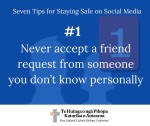
• Tip #2 Tuesday 21 March: Do a Facebook Privacy Checkup on your account. Post text: It’s easy to do a quick check – you can find the Privacy Checkup under the Settings & Privacy section of your profile.
Click here to download slide # 2.
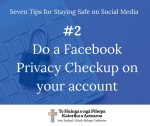
• Tip #3 Wednesday 22 March: Learn more about privacy at facebook.com/about/basics Post text: Facebook has an easy-to-follow tutorial to help you control and manage your privacy settings – the Meta Privacy Centre also has great resources.
Click here to download slide # 3
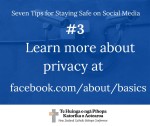
• Tip #4 Thursday 23 March: Check that anyone who contacts you or you chat with is genuine – not everyone is who they say they are. Post text: Before you engage – check: Do I know this person? Does their profile photo match the information they have shared about themselves, and does it look genuine or staged, or potentially copied from someone else? Does the Facebook address match their name? Are there any inconsistencies on their information page or something that just doesn’t make sense?
Click here to download slide # 4
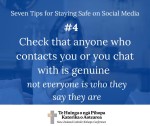
• Tip #5 Friday 24 March: Don’t provide or share any personal information or passwords. Post text: A legitimate person or business will never request personal, financial or security information over social media – so if someone is asking it’s unlikely to be for a legitimate reason.
Click here to download slide #5
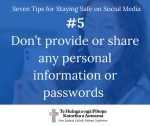
• Tip #6 Saturday 25 March: Change your Privacy Settings so only friends can see your other friends. Post text: If only people you are connected to can see your other friends this helps to ensure that scammers can’t access or connect with your friends through you.
Click here to download slide #6
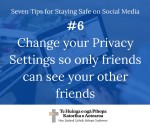
• Tip #7 Sunday 26 March: Be sceptical. Ask yourself “Why do they want to know this?” & “What could they do with that information?” Post text: Be very wary of anyone seeking to connect or get information from you; don’t engage with ‘clickbait’ posts or competitions. Always have a healthy sense of scepticism to your online interactions.
Click here to download slide #7
